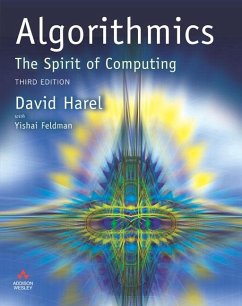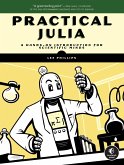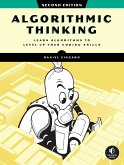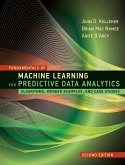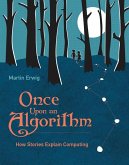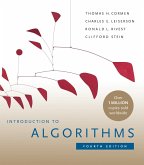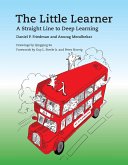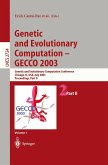The best selling 'Algorithmics' presents the most important, concepts, methods and results that are fundamental to the science of computing. It starts by introducing the basic ideas of algorithms, including their structures and methods of data manipulation. It then goes on to demonstrate how to design accurate and efficient algorithms, and discusses their inherent limitations. As the author himself says in the preface to the book;
'This book attempts to present a readable account of some of the most important and basic topics of computer science, stressing the fundamental and robust nature of the science in a form that is virtually independent of the details of specific computers, languages and formalisms'.
Product Description
The best selling 'Algorithmics' presents the most important, concepts, methods and results that are fundamental to the science of computing. It starts by introducing the basic ideas of algorithms, including their structures and methods of data manipulation. It then goes on to demonstrate how to design accurate and efficient algorithms, and discusses their inherent limitations. As the author himself says in the preface to the book; 'This book attempts to present a readable account of some of the most important and basic topics of computer science, stressing the fundamental and robust nature of the science in a form that is virtually independent of the details of specific computers, languages and formalisms'. Features + Benefits
Whole text thoroughly updated to include material on the object-oriented paradigm, such as classes and instances, inheritance and abstract data types
Contains two new chapters; one discussing modern and exciting approaches to computation, such as quantum and molecular computing, genetic algorithms and neural networks, the second covering system development and software engineering
Chapter 3 (Programming Languages) has been updated with referneces to Pascal, Snobol, and APL being replaced by discussion of C++ and Java.
Backcover
From a review of the first edition:
'This book is a veritable tour de force. Harel writes with uncommon verve, clarity and imagination.'
'Through the use of tantalizing questions and aptly chosen and often amusing examples, the author transmits to the reader the excitement and intellectual satisfaction of computer science research. Without the use of formal mathematics and without any sacrifice of intellectual integrity, he conveys to the general reader the profound principles on which computer science is founded and which hitherto were only accessible in abstruse and esoteric textbooks and papers.'
'This is scientific writing at its best.'
Dr Stan Scott, Queen's University Belfast. The Times Higher Education Supplement.
This book tells the story of the concepts, ideas, methods and results fundamental to computer science, in a form independent of the details of specific computers, languages and formalisms. It concerns the true 'spirit' of computers; with the 'recipes' that make them tick - their algorithms.
New to this edition
Chapters on software engineering and on reactive systems.
Thoroughly revised chapter on programming languages.
New material on quantum and molecular computing.
Whole text thoroughly updated to include new material on many topics, including abstract data types, the object-oriented paradigm, primality testing, and system verification and validation.
David Harel is Professor and Dean of the Faculty of Mathematics and Computer Science at the Weizmann Institute of Science. He is renowned for outstanding research in many areas of the field, and has recently been awarded the Israel Prize in Computer Science.
Yishai Feldman is on the faculty of the Efi Arazi School of Computer Science at the Interdisciplinary Centre, Herzliya. He specializes in the use of atificial-intelligence techniques in software engineering and its real-world applications. Preface
Acknowledgments
PART I. PRELIMINARIES
1. Introduction And Historical Review
or, What's It All About?
2. Algorithms And Data
or, Getting It Done
3. Programming Languages and Paradigms
or, Getting It Done by Computer
PART II. METHODS AND ANALYSIS
4. Algorithmic Methods
or, Getting It Done Methodically
5. The Correctness of Algorithms
or, Getting It Done Right
6. The Efficiency of Algorithms
or, Getting It Done Cheaply
PART III. LIMITATIONS AND ROBUSTNESS
7. Inefficiency and Intractability
or, You Can't Always Get It Done Cheaply
8. Noncomputability and Undecidability
or, Sometimes You Can't Get It Done At All!
9. Algorithmic Universality and Its Robustness
or, The Simplest Machines That Get It Done
PART IV. RELAXING THE RULES
10. Parallelism, Concurrency and Alternative Models
or, Getting Lots Of Stuff Done at Once
11. Probabilistic Algorithms
or, Getting It Done by Tossing Coins
12. Cryptography and Reliable Interaction
or, Getting It Done in Secret
PART V. THE BIGGER PICTURE
13. Software Engineering
or, Getting It Done When It's Large
14. Reactive Systems
or, Getting It to Behave Properly Over Time
15. Algorithmics And Intelligence
or, Are They Better at It Than Us?
Postscript
Selected Solutions
Bibliographic Notes
Index
'Algorithmics' presents the most important, concepts, methods and results that are fundamental to the science of computing. It starts by introducing the basic ideas of algorithms, including their structures and methods of data manipulation. It demonstrates how to design accurate and efficient algorithms, and discusses their inherent limitations.
'This book attempts to present a readable account of some of the most important and basic topics of computer science, stressing the fundamental and robust nature of the science in a form that is virtually independent of the details of specific computers, languages and formalisms'.
Product Description
The best selling 'Algorithmics' presents the most important, concepts, methods and results that are fundamental to the science of computing. It starts by introducing the basic ideas of algorithms, including their structures and methods of data manipulation. It then goes on to demonstrate how to design accurate and efficient algorithms, and discusses their inherent limitations. As the author himself says in the preface to the book; 'This book attempts to present a readable account of some of the most important and basic topics of computer science, stressing the fundamental and robust nature of the science in a form that is virtually independent of the details of specific computers, languages and formalisms'. Features + Benefits
Whole text thoroughly updated to include material on the object-oriented paradigm, such as classes and instances, inheritance and abstract data types
Contains two new chapters; one discussing modern and exciting approaches to computation, such as quantum and molecular computing, genetic algorithms and neural networks, the second covering system development and software engineering
Chapter 3 (Programming Languages) has been updated with referneces to Pascal, Snobol, and APL being replaced by discussion of C++ and Java.
Backcover
From a review of the first edition:
'This book is a veritable tour de force. Harel writes with uncommon verve, clarity and imagination.'
'Through the use of tantalizing questions and aptly chosen and often amusing examples, the author transmits to the reader the excitement and intellectual satisfaction of computer science research. Without the use of formal mathematics and without any sacrifice of intellectual integrity, he conveys to the general reader the profound principles on which computer science is founded and which hitherto were only accessible in abstruse and esoteric textbooks and papers.'
'This is scientific writing at its best.'
Dr Stan Scott, Queen's University Belfast. The Times Higher Education Supplement.
This book tells the story of the concepts, ideas, methods and results fundamental to computer science, in a form independent of the details of specific computers, languages and formalisms. It concerns the true 'spirit' of computers; with the 'recipes' that make them tick - their algorithms.
New to this edition
Chapters on software engineering and on reactive systems.
Thoroughly revised chapter on programming languages.
New material on quantum and molecular computing.
Whole text thoroughly updated to include new material on many topics, including abstract data types, the object-oriented paradigm, primality testing, and system verification and validation.
David Harel is Professor and Dean of the Faculty of Mathematics and Computer Science at the Weizmann Institute of Science. He is renowned for outstanding research in many areas of the field, and has recently been awarded the Israel Prize in Computer Science.
Yishai Feldman is on the faculty of the Efi Arazi School of Computer Science at the Interdisciplinary Centre, Herzliya. He specializes in the use of atificial-intelligence techniques in software engineering and its real-world applications. Preface
Acknowledgments
PART I. PRELIMINARIES
1. Introduction And Historical Review
or, What's It All About?
2. Algorithms And Data
or, Getting It Done
3. Programming Languages and Paradigms
or, Getting It Done by Computer
PART II. METHODS AND ANALYSIS
4. Algorithmic Methods
or, Getting It Done Methodically
5. The Correctness of Algorithms
or, Getting It Done Right
6. The Efficiency of Algorithms
or, Getting It Done Cheaply
PART III. LIMITATIONS AND ROBUSTNESS
7. Inefficiency and Intractability
or, You Can't Always Get It Done Cheaply
8. Noncomputability and Undecidability
or, Sometimes You Can't Get It Done At All!
9. Algorithmic Universality and Its Robustness
or, The Simplest Machines That Get It Done
PART IV. RELAXING THE RULES
10. Parallelism, Concurrency and Alternative Models
or, Getting Lots Of Stuff Done at Once
11. Probabilistic Algorithms
or, Getting It Done by Tossing Coins
12. Cryptography and Reliable Interaction
or, Getting It Done in Secret
PART V. THE BIGGER PICTURE
13. Software Engineering
or, Getting It Done When It's Large
14. Reactive Systems
or, Getting It to Behave Properly Over Time
15. Algorithmics And Intelligence
or, Are They Better at It Than Us?
Postscript
Selected Solutions
Bibliographic Notes
Index
'Algorithmics' presents the most important, concepts, methods and results that are fundamental to the science of computing. It starts by introducing the basic ideas of algorithms, including their structures and methods of data manipulation. It demonstrates how to design accurate and efficient algorithms, and discusses their inherent limitations.
From the reviews of the third edition: "This book should be on any short list for a central course in computer science. It is designed to provide a uniform background on which all students might draw. It has a good-humored, easy style, which would make any reader unwilling to close the book after opening it anywhere. All computer scientists should have this book. ... the bibliography is organized in a convenient chapter-by-chapter form, which makes the book useful for advanced work, and the exercises will help instructors identify capable students." (Harvey Cohn, ACM Computing Reviews, August, 2012) "This is a reprint of the 3rd edition on the occasion of the 25th year of the existence of the book; it is also intended to honor Alan Turing's 100th birthday. ... it is highly readable, even if one is largely acquainted with the field. It is very well written, containing many illustrative examples, suited also for the non-specialist." (Gunther Schmidt, Zentralblatt MATH, Vol. 1243, 2012)
